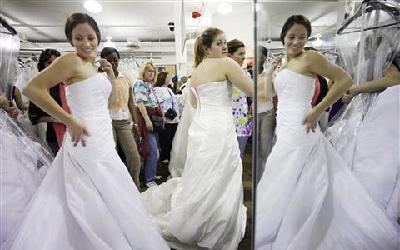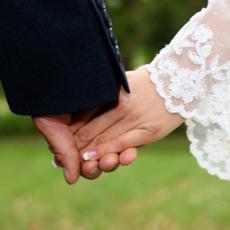
FAITH LAPIDUS: Welcome to THIS IS AMERICA in VOA Special English. I'm Faith Lapidus.
BOB DOUGHTY: And I'm Bob Doughty. This week on our program, we talk about couples and relationships.
(MUSIC: Pachelbel's Canon)
FAITH LAPIDUS: What do traditional American weddings look like? Well, in some ways, they look like smaller versions of last month's wedding of Kate Middleton and Prince William in London.
The bride traditionally wears a long white dress and the groom might wear a uniform if he is in the military. Otherwise he usually wears a tuxedo or suit. A member of the clergy usually leads the ceremony, and the bride and groom exchange rings and vows.
But getting married is not the only way some American couples choose to declare their love.
(MUSIC: "White Wedding"/Billy Idol)
ELLEN: "Maybe we will get married someday. Maybe we'll get matching tattoos someday. But at this point it's just a party."
BOB DOUGHTY: Ellen and her boyfriend, Doug, have been a couple for more than 11 years. They own a house together in northern California. This spring, Ellen and Doug decided to celebrate their relationship. They invited 130 friends to a party. Ellen wore a big pink gown. Doug came dressed as a red, ripe strawberry.
Everyone ate a nice dinner outdoors, then went inside to dance. Ellen and Doug did not read vows or exchange rings -- there was no ceremony, no kiss, no wedding.
ELLEN: "We feel like we are together. This didn't really need to be confirmed at this point in our relationship. But we did want to have a party and celebrate it. But it was definitely confusing for other folks, I think, just because they hold specific expectations culturally and socially about marriage."
Some of the guests were not sure what to think of Ellen and Doug's celebration -- or even how to describe it. Some found it easier to tell other people that they were going to a wedding. That way they did not have to take the time to explain.
So what did Ellen's family think of this untraditional celebration? This is her aunt.
ELLEN'S AUNT: "I actually don't know what to say about it. I was quite surprised first of all and was trying to find out from Ellen for the longest time what this was about."
This is Ellen's godfather.
ELLEN'S GODFATHER: "As long as two people care about each other, love each other, whether they want to get married or not, as long as they don't hurt anyone else, and they love each other, it's not up to us to judge them, really."
And this is Ellen's father. What did he think of the whole situation?
ELLEN'S FATHER: "I want a grandchild. I'll be 70 in July, and I just -- whether they get married or not, I want a grandchild."
(MUSIC: "My Sharona"/The Knack)
FAITH LAPIDUS: Last year's national census counted more than six million unmarried couples in the United States who were living together. That was a 13 percent increase from the last census in 2000.

Americans have been waiting longer to get married. The Census Bureau estimates that in 1890, half of all women who got married for the first time were 22 or younger. For men the median age -- meaning half were younger and half were older -- was 26. By last year, however, the median age for women was 26, and for men it was 28.
A new Census Bureau report shows that 25 years ago, one in four women age 25 to 29 had never been married. In 2009 that number was close to half.
BOB DOUGHTY: There are different reasons why people wait to get married. They may want to first complete their education or establish a career or gain financial security. Or they may have just not found the right person.
But experts say more and more Americans have simply chosen not to get married or at least not to take that step too quickly.
The Alternatives to Marriage Project is a nonprofit organization based in Brooklyn, New York. It works for equality and fairness for unmarried people, including people who are single or live together before marriage.
Nicky Grist is the director of the Alternatives to Marriage Project. She says young couples might live together to save money or because they are trying to decide whether to get married.
And some couples -- like Ellen and Doug -- just might not think marriage is right for them.
(MUSIC: "Got Your Back"/Matt the Electrician)
FAITH LAPIDUS: Another organization, the National Marriage Project at the University of Virginia, works to support marriage. The director is Bradford Wilcox, a sociology professor. He points out that couples who have good incomes and college degrees tend to be married, especially if they have children.
But Mr. Wilcox says many young adults decide not to get married because they have seen their parents or their friends get divorced. As a result, they may not have much hope that a marriage will last.
(MUSIC: "Use Somebody"/Kings of Leon)
BOB DOUGHTY: Nicky Grist at the Alternatives to Marriage Project says whether two people are married is not important. What is important, she says, is that they take care of each other and depend on each other.
NICKY GRIST: "What we're seeing are increasing numbers of very stable, long-term non-married relationships, and that includes both romantic relationships and also other kinds of relationships where people are simply committed to caring for one another, whether as friends or as extended family. And what we see is that caring goes beyond the one kind of relationship called marriage. And it's really caring that society should support."
But most employers, for example, offer health insurance to a worker's partner only if the couple is married. Unmarried couples may also pay more taxes. And if one person dies, the other person may have a difficult time claiming the couple's money or property.
FAITH LAPIDUS: Brad Wilcox at the National Marriage Project says marriage creates a more stable life than living together. As a result, he says, having married parents is better for children.
BRAD WILCOX: "You can't treat cohabitation like marriage because they're fundamentally different realities. Cohabitation offers people a lot more flexibility and freedom, but that's the downside of it too, looking at it from a more relational -- and particularly from a child's -- perspective."
BOB DOUGHTY: In recent years several American states and the District of Columbia have made same-sex marriage legal. But in 1996 Congress passed the Defense of Marriage Act, or DOMA. For federal purposes it defines marriage as the legal union between a man and a woman. President Bill Clinton signed it into law.
In February of this year, however, President Obama told the Justice Department to stop defending the law in court. He says it violates the Constitution. The 14th Amendment says states may not deny anyone the equal protection of the laws. In other words, states cannot give a right to some people but not to others.
President Obama says DOMA discriminates. But the law remains in place. The courts are still debating how to handle this law and the issue of same-sex marriage.
FAITH LAPIDUS: Not all of the issues that face unmarried couples or same-sex couples involve debates over laws, morality or social policy. One question that many couples find difficult to answer is simply what to call each other.
BOB DOUGHTY: In the United States, the tradition has been that a wife takes her husband's last name in place of her own. But many women now add their husband's name or keep their own name. Some couples come up with a new combination for themselves or their children.
Meg Keene started the blog A Practical Wedding. Ms. Keene says one of the hottest topics on her blog is whether women should take their husband's last name. Ms. Keene has been married for more than three years but has still not decided what to do about her own name.
MEG KEENE: "I had my name for almost 30 years by the time I got married. I'm going to be a published author under my name. I'm very tied to it. It's an ongoing negotiation."
(MUSIC: "That's Not My Name"/The Ting Tings)
FAITH LAPIDUS: Our program was written by Kelly Nuxoll. I'm Faith Lapidus.
BOB DOUGHTY: And I'm Bob Doughty. We welcome your comments. Go to voaspecialenglish.com, where you can also read and listen to all of our programs. And you can write to us on Facebook at the VOA Learning English page. Join us again next week for THIS IS AMERICA in VOA Special English.
Families joined by marriage are unlikely fit in 'Jumping The Broom'
Most believe there's nothing wrong with cohabitation
(来源:VOA 编辑:崔旭燕)
